With three albums released, Belgian act Your Life On Hold has become one of Goth rock most promising bands, thanks to their melancholic-but-with-a-touch-of-hope music. We have interviewed Jan Dewulf /John Wolf who is playing with his band next Sunday 31st October at the Belgian festival Sinner’s Day.
Header photo: Gwenny Cooman
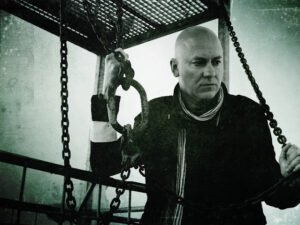
Pic: Gwenny Cooman
—Your Life On Hold seems like a description of the last 18 months. How did you choose such a name for your Goth project?
—Finding a good band name is a tough one. A band name shouldn’t be too difficult, but it shouldn’t be too easy either. I like band names that raise some questions, band names that invite you to reflect about it. I was going through a rather difficult phase in my life where I was struggling with depression and where I really had the feeling that everything was on hold. So, this explains the origins of the band name.
There is indeed a weird parallel between the pandemic and the themes I approach with Your Life On Hold, and especially with the last album Echoes from the bardo. The “bardo” is the Tibetan term for the Buddhist “intermediate state” between death and reincarnation, but torn loose from the Tibetan or any other religious interpretation it can easily be seen as a metaphor for the situation we’ve been in the last 18 months. It’s the in between world that no-man’s-land between different stages in your life, between relationships, between darker days and better days. It’s the very core of what Your Life On Hold is all about. Today, the pandemic puts everyone’s life “on hold” around the world. Our band name couldn’t be more a topical subject, I guess. This lockdown could be seen as a “bardo”-like state. It’s a weird coincidence of course that the concept of our last album fits the current state of events, as the idea was conceived earlier on.
—How did you decide to create Your Life on Hold after having two more electronic projects before?
—At some point I was completely bored of turning knobs and pushing buttons. Somehow, the electronic music started feeling cold and soulless to me. Looking back at it now, it feels like very natural to make gothic rock music. But it wasn’t planned at all in fact. It all started after reinventing a previous electronic project into a more guitar-oriented adventure, and a midlife crisis that put things back to a full stop rather quickly. But after I bought myself a couple of new guitars, I started experimenting again in the studio, drawing a final line under the electronic direction I’ve been going for twenty years.
At first, things were sounding rather “industrial”, but when I switched off the distortion pedal and pushed that reverb button, it finally hit me: I was destined to make gothic rock. I recorded some songs, sent some of that stuff to Solar Lodge, and the rest is history.
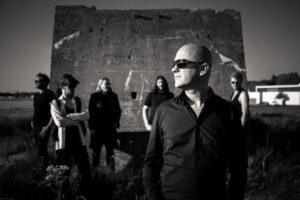
Pic: Ghilain Vermeersch
—What are your main influences from Goth music?
—If I had to mention one band, I guess I’d have to mention Love Like Blood as my favourite. Love Like Blood is the blueprint for me how gothic rock should sound like. But there are of course many other bands that I like and that influenced me. In general, I think it’s about a certain sound that makes things sound like “gothic rock”: that melancholic sounding guitar. For me, it’s a quest for sound to create that very feeling.
—You have defined your music as gloomy but with a bit of hope. Do you think that music needs to give a bit of hope, even if it’s Goth music as life can already be quite miserable?
—I wouldn’t use the word “miserable”. For me “goth” is about art that is “dark”, but not necessarily miserable or bad. As a kid I was fascinated by monsters and darkness. I always thought Skeletor was more interesting than He-Man, if you know what I mean. My interest in the dark and the obscure was what brought me to gothic music. I’m still totally in love with everything dark and melancholic. The music of YLOH and its concept is definitely dark, but there’s some light hidden in between indeed. YLOH is the melancholic but consoling soundtrack to a life of solitude and loss. The music expresses the inner torments when life gets stuck in sorrow and despair. But it also wants to comfort the troubled soul and soothe the consuming feeling of desolation.
—I have read different things about this: were your first two albums completely recorded by yourself or were you already helped by the people who would later become part of the band?
—In general, I make the music pretty much on my own in the studio. When things are almost finished, I invite some of the guys to add some bass or specific guitar parts. The first three albums were made like this. The idea is to have them even more involved in the future because they are definitely better musicians than I am. The first album was mixed by Artaud (Merciful Nuns/Solar Lodge), but I mixed the other albums myself.
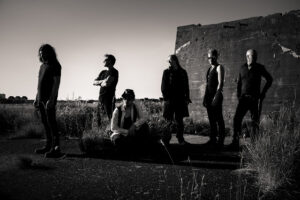
Pic: Ghilain Vermeersch
—When did you start looking for a band? Just to go live or you wanted Your life on hold to be a proper band?
—Emeric, who was already part of a previous project, was the driving force of bringing a live band together. For me it was quite magical to see and hear, my tracks becoming “alive” as they were played by a bunch of six instead of me being alone in the studio. I really believe the live experience is more interesting than the album versions. There’s more magic involved. The idea is to have the band more involved in the sound of the next album. So yes, I definitely like to think of us as a “proper” band.
—What can you please tell me of the rest of the member of Your Life On Hold? Augustijn has released a couple of albums on his own, hasn’t he?
—Augustijn, who is also the son of (the in Belgium quite famous artist) Willem Vermandere, has indeed a rather successful solo career. Although active in a totally different scene, he sounds like he’s been listening to gothic rock all his life. He definitely adds magic to the YLOH sound. I’ve been working with Emeric for years now and he’s a very flexible and talented guitar player and a cool guy to work with. I knew guitar player Stefaan from other projects, and we had been wanting to do something together for a long time already. YLOH became the ideal occasion. He brought in Jonas, a very talented keyboard player, also active in several metal projects. Erwin, or Jacky as we like to call him, is the drummer. Not only adding rhythm to the whole thing, but also a lot of humour. We’re laughing our ass off with his jokes.
—The first album was produced by Artaud Seth, from Garden of Delight and Merciful Nuns. He is also behind Solar Lodge, right? How is your relationship with the label and with him?
—When I finished the demos of the first album, I knew the material was strong. But finalizing music for an album is always a hard and stressful last part of the process. Because it was the first time that I was finishing a rock album, after producing electronic music for twenty years, I felt I needed help. So, I asked Artaud to do the final mix of the songs. I’m both thankful and honoured that he was so kind to do that. I learned very much from it and was able to do the mix myself for the second album. I’m happy to be part of the Solar Lodge family as they have a strong image and unique face in the gothic rock scene. And I’m happy to call Artaud a friend.
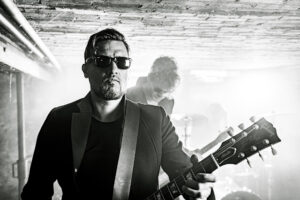
Pic: Pieter Clicteur
—You said that “making songs is a way of exorcising my demons”, but can you tell us what are your demons? Did you manage to exorcise all of them?
—Life happens, that’s what’s going on basically for all of us. It goes with ups and downs, joy and disappointments. I’m a melancholic, so my songs and stories will always embrace the darker and the rather sad side of life. For me personally it’s more inspiring to focus on that darker side as I’m obviously making dark music. But it doesn’t necessarily mean I’m sad or depressed every minute of my life. I’m inspired by what’s going on in my own life but when I write songs, I want it to be universal so people can reflect with the emotions in the songs. It’s not about me, I want the songs to become stories of the listener as well.
—The band has been described as Post-Goth. What does this label mean to you?
—It sounds cool. And I wanted to express we are a new and another chapter in the ongoing story of gothic rock. We often work with a harder wall of sound that has a certain “post rock/post metal” character to it. Therefore, we like to call it “post goth”, because of the rich array of influences and textures, bringing the classic gothic rock sound to a new level.
—How has the music of Your Life on Hold changed with the third album? You said that it’s more melodic and tries to experiment a little.
—I wanted to inject the music with more melody and variety indeed. And when writing the album, I was working more “song” oriented instead of “sound” oriented, if you know what I mean. It was more a quest for songs, instead of a quest for a certain sonic landscape. And I allowed myself to work with different kinds of sounds and added more electronica as textural background.
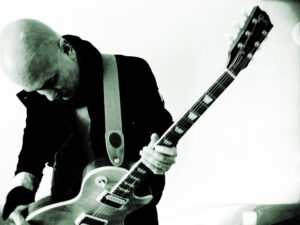
Pic: Gwenny Cooman
—As you said before, the concept of the album was the “bardo”, according to you the feeling of being desperate and feel stuck but also the chance of escaping (the hope of the previous question). How autobiographical was this album? Is it based on any situation you were living at the moment?
—Yes, the lyrics are always in some way based on personal stuff, but I make sure the story gets universal in the end. I don’t want it to be songs about Jan Dewulf, because that would make no sense. Once a song is out there, the listeners make it a story of their own.
—The band’s two EPs, Imprisoned and exorcised and the Lockdonw EP have a couple of new versions of old tracks that according to you they are “an ode to the sound of the drum machine”. Are these new versions the “most danceable side” of Your Life On Hold?
—Well, I wouldn’t call it a real scientific music theory, but roughly outlined, you could say that there are two types of gothic rock: the one using drum machines and the other using real drums. Respectively The Sisters of Mercy and Fields of the Nephilim made the blueprints for both directions. Looking at it like this, you could consider Your Life On Hold as being part of the Nephilim clan. On our albums we choose the more organic sound of a real drum kit. Especially live on stage it gives our sound more sweat, magic and chemistry. But we really DO love the sound of a good drum machine. The sound of Sisterhood’s Gift or Sisters’ Floodland for example: what a magical sound! That’s why we have chosen the machines for that particular EP, where we allow more electronica and drum machines. With an obvious wink, we like to call these alternative takes “merciless versions”, I’m sure this needs no further explanation. It’s a window allowing myself to add more electronica in the more organic sound of YLOH.
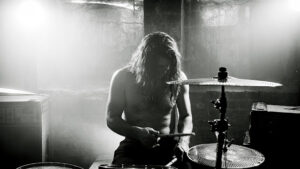
Pic: Pieter Clicteur
—We don’t see so many references to Allen Ginsberg in Goth culture, but you had taken a quote from his most famous poem, Howl, to name your first album and used his voice in “Sunflower Sutra”. What do you find inspiring in his work?
—I like the beat generation. For some reason it really appealed to me. That adventurous quest for freedom but also a restlessness and a tendency for melancholy. The poem “Sunflower Sutra” in particular was just a beautiful poem that really combined a dark melancholy but with some light hidden in between the lights. And that’s really what YLOH is all about.
—From your interviews, I have been gathering other literature influences: Dutch poet Menno Wigman and Willem Elsschot. How have they influenced your writing? Is there any other writer that have been important for you?
—I studied philosophy and as a philosopher you’re on that huge quest for meaning and truth so to speak. Throughout history, philosophers formulated big answers to the big questions. But I stepped out of that philosophical quest. And that’s exactly what I like about literature or art in general: it’s not about finding answers. Literature touches upon the same issues without seeking answers. It gets to the heart of what life is all about, without having to explain that very life. You find comfort in the recognizable. And that’s what I want to do with my music. I want what I sing about to be recognizable. Wigman is probably my favourite poet, but I also like the stuff by Peter Verhelst to name just one.
—Normally we save the last questions on side projects and previous bands, but in your case, it can take a full interview. Your first band was Mildreda (at least the first one famous). What can you tell us of this project? You released a new album this year, right?
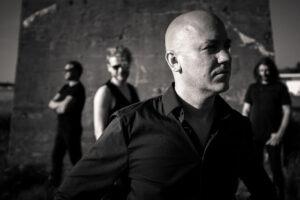
Pic: Ghilain Vermeersch
—Mildreda has always been there somewhere in the background. It was never totally forgotten. Sometimes I felt the desire to make a Mildreda tune, and it was always striking to discover how those darker melodies came out spontaneously. But those attempts were never really “serious”, more like experiments on the side, confirming that I still had it in me, though.
I think I needed the maturity before I was able to create the Your Life On Hold stuff, and to finally come home again with Mildreda. With both projects I return to my true roots: dark music, whether it’s guitar based or electronic. They both have the same colour: black. Both bands are equally important for me today.
And another important thing: I need to believe in myself and my own songs in order to make the music really work. Now I’m finally there with Mildreda as well. For the first time in fact, and this explains why things were postponed several times earlier on. On this first real physical album, I tell a true personal story and it’s the first time I do this with Mildreda.
—Same about Diskonnekted, it was a more dance-related project, right?
—It was around the turn of the century. It was the era of Leftfield, Underworld, Fluke etc., and I wanted to make that stuff myself, so I started a new project, incorporating a lot of dance influences and thus leaving the darker electro path. Diskonnekted has been an interesting playground for me. I made some good stuff but some less impressive things too. But the important thing is that throughout the years I became a better producer, a better musician and a more mature artist. I became the artist that I am today, knowing what I want to achieve, tell and create. While there was no plan when I started Diskonnekted, there is more of a masterplan today.
—You have produced and write the music of the last Dive album and collaborated in the past with some remixes for that project. What can you please tell us about your work with Dirk Ivens? You are also producing the new Sygo Cries album, right?
—As a producer it’s very enriching to be working on several projects. It’s inspiring and it broadens your musical perspective. I produced and wrote the music of the latest Dive album. And I produced the forthcoming EP for Sygo Cries indeed as well. I guess I’m a bit like a chameleon in the studio because I never have a problem switching from one project into the other. All projects have its own identity, philosophy and sound. As a producer I treasure and respect that identity.
—How has the pandemic affected your career? How have you lived these crazy last months?
—Deep down, there’s a hermit living inside of me. So, I kind of like being locked up on my own. And as many artists will confirm, being creative is a lonesome activity. This explains why the lockdown was no dramatic change of scenery for me personally.
—What can we expect in the future of Your Live On Hold? A new album?
—Definitely. Already working on demos.
—What can we expect of the band’s concert at Sinner’s Day
—It will be sort of “best of” combining old and new stuff.



